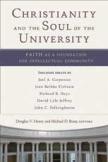Higher Learning
Baker Academic. 192p $24.99
In 2004, Baylor convened a conference to explore what it would mean for a university to reclaim its Christian heritage, and a collection of the papers has now been published under the title Christianity and the Soul of the University: Faith as a Foundation for Intellectual Community. Though most of the contributors address the issue from a distinctly Protestant perspective, much of their insight is equally integral to the ongoing struggle over identity on Catholic campuses.
One clear realization to emerge from the volume is that Protestants may actually have a more difficult time maintaining a meaningfully Christian university than Catholics. As Daniel Williams, a religion professor at Baylor, explains, antitraditionalist and antidogmatic perspectives are built into the Protestant religious ethos, and an emphasis on private judgment and personal experience as an arbiter of ultimate meaning render articulable institutional boundaries elusive. This skepticism of tradition and community can leave Protestants rudderless on issues not addressed explicitly by Scripture, which may help explain why Protestant schools that do achieve a robust religious identity tend to rely on rigid codes of conduct. (Wheaton College, for example, did not lift its 143-year-old ban on dancing until 2003.)
Judging by the contributors’ frequent invocations of John Paul II’s Ex Corde Ecclesiae as a helpful statement of the Christian university’s mission, Protestants may have realized that Catholics have some insight on how to weave the Gospel into the fabric of a community. But Catholics also stand to learn from Protestants, who can bring a fresh focus on the simplicity and centrality of the Christian story. In this regard Steven Harmon, a theology professor at Campbell University, urges academics to reclaim the story as the first-order foundation of Christian intellectual community in order to provide common ground on which faculty from multiple denominational traditions and theological perspectives may stand together while making their own distinctive contributions to the second-order argument that the integration of faith and learning entails.
Perhaps the book’s most helpful contribution is its identification of essential qualities that will mark an intellectual community founded on the truth claims of Jesus Christ. Three in particular stand out.
First, the Christian virtue of hospitality, according to Aurelie Hagstrom, a theology professor at Providence College, reflects a radically different and compelling alternative to tolerance. While tolerance is a false sort of engagement given its tendency to trivialize what is most important to us, hospitality demands a personal, authentic encounter that is self-emptying and open even to those with whom we have deep philosophical, theological, and political disagreements. Under this view, the university’s sponsoring religious community acts as host, and community members from other religious traditions are welcomed as guests. In today’s hyper-egalitarian campus environment, attaching the guest label to non-Christians will smack of paternalism, but the host-guest paradigm may be inescapable if the Christian story is to have a privileged role as a shaper of the institution and its mission.
Second, if the personal engagement contemplated by hospitality is to be authentic, conflict must be embracedeven facilitatedat a Christian university. Steven Harmon insists that Christian identity is hindered by a fear, not of communal theological reflection per se, but rather of the intellectual conflict arising from this much-needed conversation. Borrowing from the work of the noted philosopher Alasdair MacIntyre, Harmon reminds us that a vital tradition will embody continuing conflict, and that a tradition without conflict is a dead or dying one. This can help reframe our orientation. Passionate debates over the implications of a university’s Christian heritage are too often taken as signals that the heritage is in jeopardy; instead, they may be signs of life.
Third, if the Christian story is to be at the center of the community’s identity, Christian worship must be at the center of the community’s life. Several contributors point out the feebleness of any Christian community that lacks a shared worship experience. Especially for a faculty that purports to be more than the sum of its parts, a regular opportunity to participate in worship together is an essential ingredient. A Christian intellectual community must build up more than the intellect.
When it comes to the secularist drift of universities, Protestants and Catholics have much in common. Still, an institution will occasionally feel constrained to define itself in terms of old antagonisms, as evidenced by Wheaton’s recent decision to fire a bright young professor for the transgression of becoming a Catholic. Such questionable line-drawing in the course of self-definition should not detract from the importance of the overall project. The struggle to articulate and defend a meaningfully Christian vision of higher education will rarely be without controversy. Indeed, Robert Sloan, Baylor’s president and the man most responsible for the school’s reinvigorated Christian identity, resigned under pressure several months after the conference from which this book emerged. Facilitating an insightful conversation about the Christian university, as Sloan did, is no guarantee that the insight will be embraced by the community and integrated into daily campus life. But the conversation is the foundation that makes tangible results conceivable, and it is the absence of conversation that is the surest sign of a Catholic university’s secularization.
For those interested in joining the conversation, or in deepening their understanding of its significance, this book is a great place to start.
This article also appeared in print, under the headline “Higher Learning,” in the January 15, 2007, issue.








